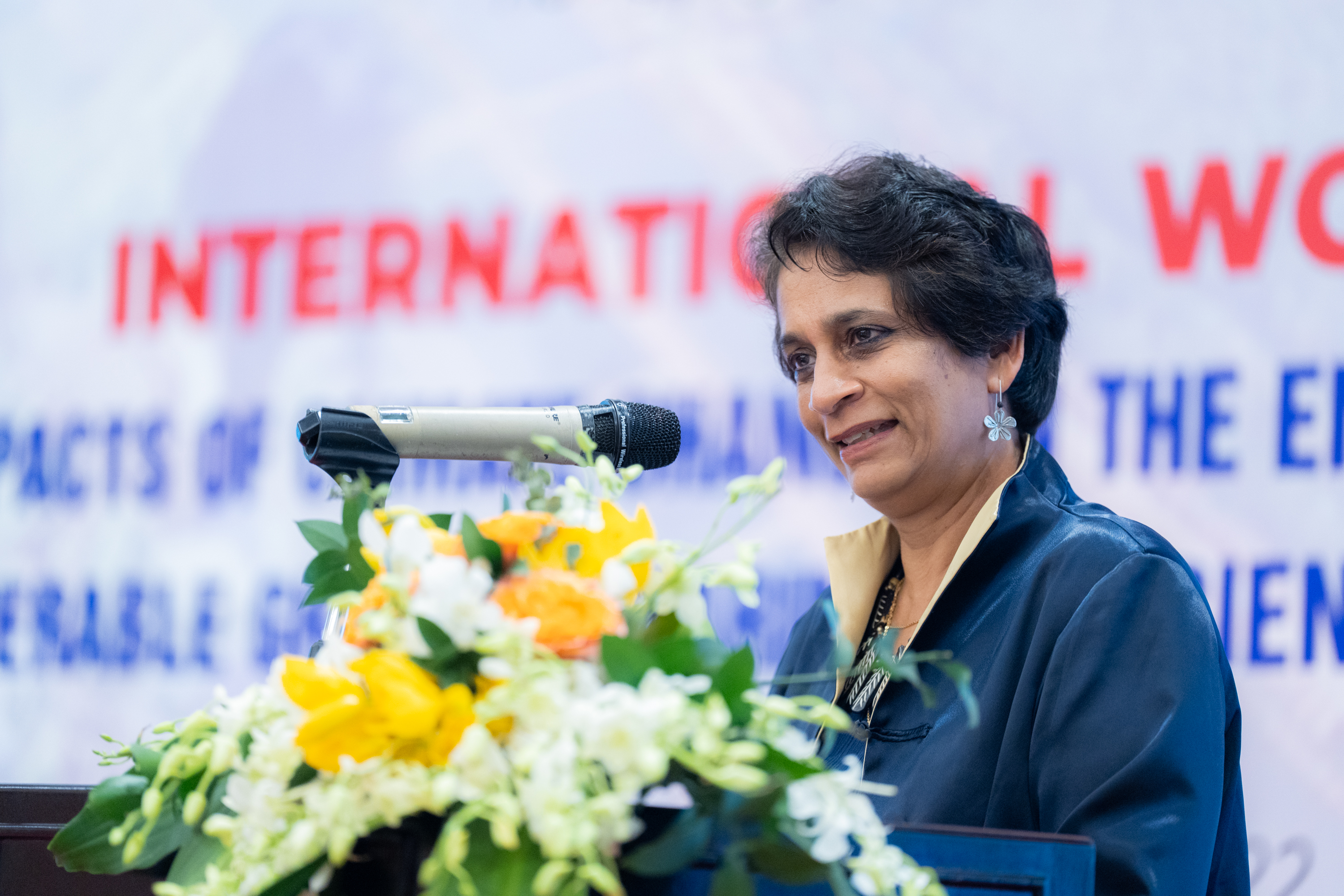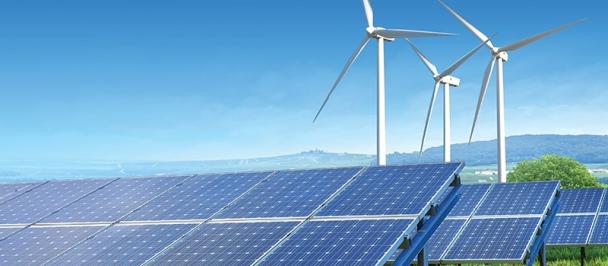International Workshop on Human Rights & Climate Change
August 2, 2022

Kanni Wignaraja, UN Assistant Secretary General, and Regional Director for Asia and the Pacific, delivered her opening remarks at the International Workshop on Human Rights & Climate Change
Thank you it has been a warm welcome from everyone I met, including my old team (sorry Caitlin but I was here first).
Do Hung Viet, Assistant Minister, Ministry of Foreign Affairs
Pauline Tamesis - UN Resident Coordinator in Viet Nam
Excellencies, Colleagues from ministries, development partners, and representatives of social organizations, academia and the UN
Good morning, Xin Chao!
It is truly an honor to deliver the keynote at today’s Workshop on ‘the Impacts of Climate Change on the Enjoyment of Human Rights of Vulnerable Groups’.I think it has taken us a while to get here, as a global community and see the strong interlinkages, that I think for vulnerable people were self-evident, but for the rest of us probably took time to recognize that this needed very specific and special attention. I wish to congratulate the Government of Viet Nam for taking on this issue as it has, and also for setting some very clear dual goals of becoming a high-income country by 2045 and meeting carbon neutrality by 2050. Now this is easier said than done, this is a huge challenge. Very few countries in the world have shown the ability to progress at a certain pace while keeping wellbeing for all of their populations and doing so in a decarbonizing model of development.
So I do appreciate the leadership demonstrated by the Government here. and I hope that that persistence which will also have to come with a lot of patience, a lot of trying and testing, that this happens over the coming few years. So the leadership of the Ministry of Foreign Affairs, at the 50th Session of the UN Human Rights Council, has really pushed this agenda forward, together with Governments of Bangladesh and the Philippines, and Pauline also referred to the new resolution [on the human right to a healthy environment] that was passed yesterday with overwhelming support by the member states [in the General Assembly].
Now I won’t go into the context of Viet Nam’s vulnerability in these areas because both of the previous two speakers did refer to current context, but I do want us to remember some words that the PM of VN highlighted at COP 26 and I quote:
(I quote) “transitioning the development model towards a green, circular, sustainable, inclusive, and humanistic economy. All that we do must be nature-based and centered around people, for they are the actors and drivers of sustainable development, to leave no one behind.” (end quote).
Now indeed environmental threats, and we are seeing this all over, in fact as I was landing here in Hanoi I saw as I switched on my phone that the Philippines had just experienced a 7.2 Richter scale earthquake and as you know the earthquake belted many countries let alone forest fires and others, this intensifying a cyclofile(?) literally is something that all countries are experiencing now and particularly hurting those living in very eco fragile zones. And often that is directly linked to what I would like to call also those living in human rights fragile zones.
So today, we will have the opportunity to discuss more how this dual ambition can be matched by the realization of climate justice and human rights justice for all Vietnamese, particularly for the ethnic minorities who live in these very fragile areas of the country.
Our guiding question then, is how to ensure that the climate change adaptation and mitigation policies and measures, including the Just Energy Transition, are effectively grounded in a Human Rights-Based Approach that puts people’s needs, voice and agency at the heart of the choices that a country makes.
So let me share three reflections to spur an inclusive and rights-based approach to climate action in Viet Nam, to match with its ambitions and goals.
The First is about pursing and sharing the data and evidence and using it to influence the policies that are needed. To illustrate - we know that certain mitigation responses such as an accelerated transition towards renewables, will have direct short-term implications on jobs, incomes and cost of living for a group of workers, including the poorest.
There are winners and losers in these choices in the short term. To know how to optimally price to make the right decisions, in these transitions, on how they impact the rights of vulnerable communities, in order to do that right, these things the data has to be known and shared. Because the measures and the countermeasures then can be more effective. And we can ameliorate some of the negative impacts, of such a transition.
Viet Nam has ratified the core human rights and climate treaties, so working the two together, with human rights standards taken from both sets of treaties, will be so integral to making these right choices. And this is where we hope, and with the UN and UNDP’s support to the National Adaptation Plan, the National Climate Change Strategy, that these can be reviewed in this light and raising the level of ambition of all of these strategies.
These are complex connections of integrated planning and policy-making. It not easy. We come from very sectored vertically defined education systems, disciplines, institutions. So suddenly, to expect that everyone is all going to work together and share data and analytics is not easy. It takes political commitment and decisions and leadership to actually make this happen.
Now I must say there are two points in my first day yesterday, that gave me real hope that this first issue on sharing data and analytics is possible. First is the complementing the national data with the PAPI data. the Provincial Governance and Public Administration Performance Index. This is about what citizens think and feel about public policy and public services. PAPI is the largest national survey that collects citizens’ feedback on and experience with governance and public administration at central and local levels. And it includes a dedicated set of indicators on environmental governance.
The second was the use of the use of the Multidimensional Poverty Index is another good example. This data challenges conventional thinking and measures. It has taken us a long time to get here and it is about time that the world woke up to, can we really assess wellbeing only with income measures. So again the fact that Viet Nam has taken this on and is absorbing it into its planning and policy making processes is a strong place to start and can support the formulation of human rights impact assessments, and then to follow up on them.
The Second reflection it has to involve everyone. Quite literally, taking a whole-of-society approach to mobilize the innovation, expertise and collaboration required to tackle the climate crisis with a human rights lens. The voices of women, youth, migrants, ethnic minorities, academia and social organizations and non-government organizations are different, sometimes chaotic, and always necessary to get the policy, investment and institutional choices and outcomes right. Therefore, their active engagement in planning and policymaking must be welcomed and enabled.
It was good to hear Assistant Minister Viet’s words at the recent Human Rights Council, calling for all voices to be heard, including those of the most vulnerable or marginalized. Herein lies significant agents of change and implementors of local climate action.
In this context, the democratic function of advocates for environmental and human rights cannot be understated. Disagreeable voices are what drive us – active participation of experts and activists should be supported not discouraged. [They] have an essential role in fostering public debate on environmental rights, justice and climate action. To fulfil that vital function freely and without interference, their inclusion needs to be protected by law and in practice
Young people made a difference at COP26, and they continue to do so. In Viet Nam, UNDP together with the Ministry of Environment and Natural Resources supported a cohort of 20 outstanding youth from all regions formulate the first Special Report on Youth for Climate Action. It reiterates their commitment and introduces a roadmap to accelerate youth-led climate actions in Viet Nam. Fortunately, they are impatience and wish to see greater acceleration!
Viet Nam has become a global leader in advocating on the human rights and climate change nexus, and the international community looks to Viet Nam’s visible and demonstrated commitment and leadership on this matter.
A Third and last reflection is to unpack this expectation of accountability. It is people who must and will hold their policy makers accountable to the international and domestic commitments made. This means some specific spaces that must be protected and ensured – for example, regular public dialogues, free access to data and information, fair dispute resolution mechanisms that address climate justice.
The disproportional negative impacts of climate change only grow harsher, on those who can least afford bear its heavy burden: developing and least developed countries are most affected, despite contributing the least to the causes of climate change. Poorest communities are hit the hardest and have least means to cope, although their carbon footprint is minimal. Women’s lives are more upended by climate change and disasters than men. It is the hurtful irony of an inverted logic.
The National Assembly, Supreme Court, central and local government, and the Business Sector all have a very responsible role to play to ensure the delivery and oversight of climate justice and equitable environmental policies, as well as a communities’ enjoyment of human rights, including the right to effective remedy.
There is increasingly more case law emerging worldwide to ensure all stakeholders follow up on their commitments and targets to reduce greenhouse gas emissions while ensuring communities’ rights to a healthy environment and a healthy life.
For example, in Brazil, the Supreme Court determined that the Paris Agreement is a human rights treaty with supranational value, and that the Government has a constitutional duty to make the Climate Fund’s resources work for purposes of mitigating climate change. In the Netherlands, Royal Dutch Shell was found to neglect its responsibility to contribute to global and Dutch environmental commitments derived from the Paris Agreement.
The engagement and legal awareness of the public is crucial for their understanding of what their rights are and how to seek their enforcement. Education on human rights impacts of climate change and legal empowerment should be a priority focus, especially for those at most risk.
In closing, all three areas I have reflected on, would require very specific commitments to move from our current state to a future state – one that puts a higher premium on rights, justice and accountability.
UN and UNDP remains deeply committed to supporting the Government of Viet Nam, private sector and civil society in ensuring the planning for climate change adaptation, mitigation, and environmental policies are aligned with human rights standards. Viet Nam’s commitment to net-zero emissions by 2050 is not only about the ‘what’ but the ‘how’ – and if it is not in an inclusive and participatory way that will leave many people behind.
Thank you for the strong collaboration with MOFA and other Ministries represented here today. We are grateful also to our international partners and wish to thank Norway for their support to these efforts.
I wish to also acknowledge the active participation of our NGO and youth partners. Without your voice and actions, that represent those often unseen and unheard, this agenda would be stalled, and could even regress. Instead, we see a community of positive collaboration present here today, that must persist to secure a healthy environment that is everyone’s right.
Thank you. Xin cảm ơn!

 Locations
Locations
